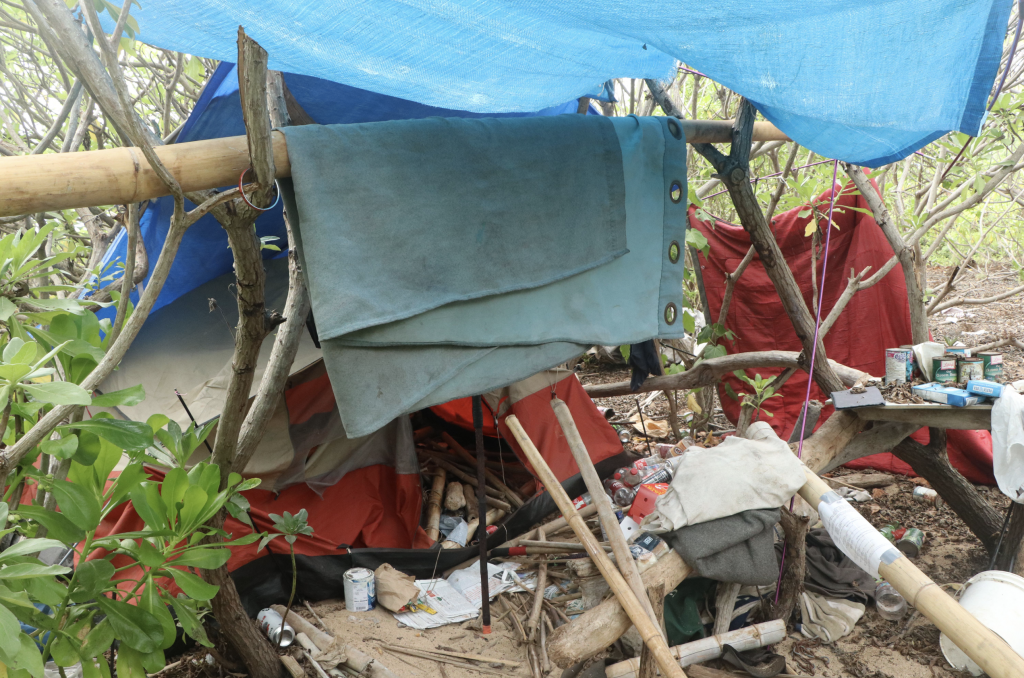Plan to set standards for Maui encampment removals debated in committee

In the wake of a controversial encampment cleanup at ‘Amala Place in Kahului, a Maui County Council committee is considering a proposal that would set standards for houseless sweeps, cleanups, interventions and other such responses.
Introduced by Council Member Gabe Johnson, the measure would set procedures for the removal and storage of property located in public places and would require that the county give people 45-day notices before removing encampments.
Testimony among about a dozen people and county deliberation on the complex topic during the council’s Affordable Housing Committee meeting last week was mixed, though.
Some testifiers supported the measure and denounced previous sweeps, saying that they’re harmful and disruptive. Others pointed to potential pitfalls in the plan, such as the difficulty of discerning between trash and belongings and the logistics of providing notice and storing items.
The measure was deferred and sent to the Commission on Healing Solutions for Homelessness for feedback. Commissioner George Kaimiola on Wednesday said that the proposal will likely be taken up at their next meeting.
Kaimiola, a Family Life Center homeless outreach worker and Maui Homeless Alliance member, told Maui Now that he supports giving notice before an intervention, which he said was done at ‘Amala Place. However, he said he takes issue with people claiming Hawaiian sovereignty rights in order to shelter in public places.
“Don’t try to kūʻē and claim puʻuhonua near the dumpster,” he said. “Puʻuhonua is a sacred place of refuge. The only place on Maui is Kukuipuka on the way past Waiheʻe and Kahakuloa. As a Hawaiian, claiming (it’s just anywhere) is sacrilegious.”
Lisa Darcy, also on the commission, testified last week, saying that the county lacked planning and foresight in the ‘Amala Place situation.
“Data shows sweeps, cleanups and disruption in routine harms peoples’ ability to function,” she said. “I urge this body to reject those and stop tolerating those harmful actions.”
Another testifier, Eyke BrathHurdman, a Lahaina attorney, opposed the measure, saying it would confer tenant rights to the houseless and have unintended consequences.
“This bill, while I can understand how it came about, most likely from the lawsuit stemming from the recent cleanup at Kanaha, I believe it is taking on more than is necessary and feasible and . . . is not going to provide the solution we want,” she said.
Lori Tsuhako, director of the county Department of Housing and Human Concerns, said that the proposal needs to be more detailed in identifying which departments are responsible for each step.
“For example, who makes the decision that personal property should be destroyed or stored? It’s kind of in the eye of the beholder,” she said. “How does the county or any department in the county operate storage and ensure the person claiming stored items is the owner of such property? Which department is responsible for posting vacate notices?”
The county’s Public Works department also voiced concerns about making certain decisions, such as discerning between trash or personal property.
“Pulehu Road is almost a daily occurrence where individuals dump belongings,” said Rowena Dagdag-Andaya, then-director of Public Works. “Beds, couches, most recently it was a dumpster filled with trash. And that’s a big expense to the county.”
Mimi DesJardins, a deputy corporation counsel with Maui County, said that council members should pay close attention to two things, according to the 9th Circuit court.
“How do you remove folks from an encampment and do shelter beds need to be available before you can do that — and the answer is, ‘Yes,’” she said. “The second one is: How do you remove personal property from public areas and provide the adequate due process? Legally those are the two things you want to laser focus on.”
The American Civil Liberties Union of Hawaiʻi sued the mayor and the county a month after the ‘Amala Place houseless sweep in September, alleging that seizing shelters and belongings without a hearing violated constitutional rights.
DesJardins during the meeting said the litigation is still pending.










